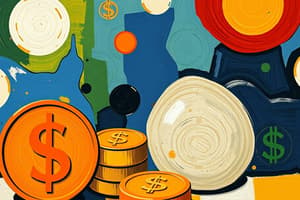Podcast
Questions and Answers
ما هو العلم الذي يهتم بشئون الحياة وإعمار الله؟
ما هو العلم الذي يهتم بشئون الحياة وإعمار الله؟
- علم الاقتصاد (correct)
- علم الاجتماع
- علم السياسة
- علم النفس
الدخل يجب أن يُنفق بطريقة تضر بالآخرين والبيئة.
الدخل يجب أن يُنفق بطريقة تضر بالآخرين والبيئة.
False (B)
ما هي إحدى المشكلات الاقتصادية التي يجب معالجة لضمان الأمن والاستقرار في المجتمع؟
ما هي إحدى المشكلات الاقتصادية التي يجب معالجة لضمان الأمن والاستقرار في المجتمع؟
البطالة
الحاجة هي أساس __________.
الحاجة هي أساس __________.
قم بمطابقة المشكلات الاقتصادية مع تعريفاتها:
قم بمطابقة المشكلات الاقتصادية مع تعريفاتها:
من هو العالم الذي عرف الاقتصاد بأنه دراسة للإنسان في أعماله التجارية اليومية؟
من هو العالم الذي عرف الاقتصاد بأنه دراسة للإنسان في أعماله التجارية اليومية؟
ليكن الجواب صحيحًا: علم الاقتصاد يدرس فقط الموارد غير المحدودة.
ليكن الجواب صحيحًا: علم الاقتصاد يدرس فقط الموارد غير المحدودة.
ما هو العلم الذي يبحث في العلاقات بين الأفراد والتي تنشأ بسبب الجهود المبذولة لإشباع الحاجات؟
ما هو العلم الذي يبحث في العلاقات بين الأفراد والتي تنشأ بسبب الجهود المبذولة لإشباع الحاجات؟
الاقتصاد هو علم ______________.
الاقتصاد هو علم ______________.
قم بمطابقة العلماء مع تعريفاتهم:
قم بمطابقة العلماء مع تعريفاتهم:
أي من الخيارات التالية يعبر عن المحاور الرئيسية للتحليل الاقتصادي؟
أي من الخيارات التالية يعبر عن المحاور الرئيسية للتحليل الاقتصادي؟
الاقتصاديون يقومون بإعطاء أحكام شخصية حول الظواهر الاقتصادية.
الاقتصاديون يقومون بإعطاء أحكام شخصية حول الظواهر الاقتصادية.
ما الذي يحاول الاقتصاديون تفسيره من خلال التحليل؟
ما الذي يحاول الاقتصاديون تفسيره من خلال التحليل؟
التحليل الاقتصادي يعتمد على دراسة __________.
التحليل الاقتصادي يعتمد على دراسة __________.
طابق بين أنواع التحليل الاقتصادي ومواضيعه:
طابق بين أنواع التحليل الاقتصادي ومواضيعه:
ما الهدف من التحليل الموضوعي؟
ما الهدف من التحليل الموضوعي؟
العبارات الناتجة عن التحليل الموضوعي تُصاغ في صورة عبارات تفسيرية فقط.
العبارات الناتجة عن التحليل الموضوعي تُصاغ في صورة عبارات تفسيرية فقط.
ما هي العبارات التي يمكن الرجوع فيها للواقع لإثبات مدى صحتها؟
ما هي العبارات التي يمكن الرجوع فيها للواقع لإثبات مدى صحتها؟
التحليل الموضوعي يهدف إلى دراسة العلاقات بين العناصر ______.
التحليل الموضوعي يهدف إلى دراسة العلاقات بين العناصر ______.
طابق الشروحات مع المفاهيم المناسبة:
طابق الشروحات مع المفاهيم المناسبة:
كيف تؤثر السياسة على الاقتصاد؟
كيف تؤثر السياسة على الاقتصاد؟
جميع التنظيمات الاجتماعية والاقتصادية لها مظهر سياسي.
جميع التنظيمات الاجتماعية والاقتصادية لها مظهر سياسي.
ما العلاقة بين الاقتصاد والسياسة؟
ما العلاقة بين الاقتصاد والسياسة؟
تؤثر _____ الدولة على البنيان الاقتصادي.
تؤثر _____ الدولة على البنيان الاقتصادي.
طابق بين العناصر التالية ومظاهرها:
طابق بين العناصر التالية ومظاهرها:
ما هي النتيجة السلبية لاستخدام الرياضيات بشكل مفرط في علم الاقتصاد؟
ما هي النتيجة السلبية لاستخدام الرياضيات بشكل مفرط في علم الاقتصاد؟
يعتبر علم الاقتصاد خياليًا فقط عند استخدام الرياضيات بشكل مبسط.
يعتبر علم الاقتصاد خياليًا فقط عند استخدام الرياضيات بشكل مبسط.
كيف يساعد استخدام الرياضيات في علم الاقتصاد؟
كيف يساعد استخدام الرياضيات في علم الاقتصاد؟
استخدام الرياضيات في علم الاقتصاد يساعد على ________ العالم الاقتصادي.
استخدام الرياضيات في علم الاقتصاد يساعد على ________ العالم الاقتصادي.
مطابقة بين الأداة الاقتصادية وهدفها:
مطابقة بين الأداة الاقتصادية وهدفها:
Flashcards
علم الاقتصاد
علم الاقتصاد
دراسة سلوك الإنسان في سياق النشاط الاقتصادي اليومي.
ندرة الموارد
ندرة الموارد
العلاقة بين حاجات الإنسان غير المحدودة والموارد المحدودة التي تتوفر.
علم الندرة
علم الندرة
التوفيق بين الموارد المحدودة والحاجات غير المحدودة
إعادة توظيف الموارد
إعادة توظيف الموارد
Signup and view all the flashcards
علم الاقتصاد
علم الاقتصاد
Signup and view all the flashcards
ما هو علم الاقتصاد؟
ما هو علم الاقتصاد؟
Signup and view all the flashcards
ما هو الدخل؟
ما هو الدخل؟
Signup and view all the flashcards
ما هو الاستثمار؟
ما هو الاستثمار؟
Signup and view all the flashcards
ما هو التضخم؟
ما هو التضخم؟
Signup and view all the flashcards
ما هو الابتكار الاقتصادي؟
ما هو الابتكار الاقتصادي؟
Signup and view all the flashcards
التفسير العلمي للظواهر الاقتصادية
التفسير العلمي للظواهر الاقتصادية
Signup and view all the flashcards
دراسة ما حدث في الماضي
دراسة ما حدث في الماضي
Signup and view all the flashcards
دراسة ما هو کائن
دراسة ما هو کائن
Signup and view all the flashcards
دراسة ما سوف يحدث
دراسة ما سوف يحدث
Signup and view all the flashcards
عدم الحكم الشخصي
عدم الحكم الشخصي
Signup and view all the flashcards
ما هو الهدف من التحليل الموضوعي؟
ما هو الهدف من التحليل الموضوعي؟
Signup and view all the flashcards
ما هي نتيجة التحليل الموضوعي؟
ما هي نتيجة التحليل الموضوعي؟
Signup and view all the flashcards
ما هي خصائص العبارات التقريرية؟
ما هي خصائص العبارات التقريرية؟
Signup and view all the flashcards
متى تزداد أهمية اختبار صحة العبارات التقريرية؟
متى تزداد أهمية اختبار صحة العبارات التقريرية؟
Signup and view all the flashcards
كيف يعمل التحليل الموضوعي؟
كيف يعمل التحليل الموضوعي؟
Signup and view all the flashcards
العلاقة بين الاقتصاد والسياسة
العلاقة بين الاقتصاد والسياسة
Signup and view all the flashcards
الجانب السياسي للتنظيمات الاقتصادية
الجانب السياسي للتنظيمات الاقتصادية
Signup and view all the flashcards
تأثير السياسة على الاقتصاد
تأثير السياسة على الاقتصاد
Signup and view all the flashcards
تأثير الاقتصاد على السياسة
تأثير الاقتصاد على السياسة
Signup and view all the flashcards
علم الاقتصاد كعلم رياضي
علم الاقتصاد كعلم رياضي
Signup and view all the flashcards
إعادة النظر في افتراضات علم الاقتصاد
إعادة النظر في افتراضات علم الاقتصاد
Signup and view all the flashcards
محدودية علم الاقتصاد الرياضي
محدودية علم الاقتصاد الرياضي
Signup and view all the flashcards
الاقتصاد الخيالي
الاقتصاد الخيالي
Signup and view all the flashcards
اختبار الافتراضات في علم الاقتصاد
اختبار الافتراضات في علم الاقتصاد
Signup and view all the flashcards
Study Notes
Introduction to Public Economics
- The development of economics took time to become a distinct field.
- Early economic thought arose from addressing human economic problems, gradually evolving over time.
- Modern economics emerged in the late 18th century.
- Adam Smith's "Wealth of Nations" (1776) marked a crucial point in the development of modern economics.
- Joseph Schumpeter highlighted thinkers from the 14th to 17th centuries as foundational figures in economics, including Ibn Khaldun.
Beginning of Economics
- The precise origin of economics is uncertain; there's no definitive date.
- Economic ideas emerged from writings addressing economic concerns.
- Economics wasn't initially a separate, formalized field of study.
Definitions of Economics
- Economists have differing views, leading to various definitions of economics.
- Adam Smith defined economics as the study of wealth creation in societies.
- Pigou defined it as enhancing human and societal well-being.
- Other definitions include: individual efforts to gain necessities of life, society's allocation of scarce resources, and society's use of resources to create and distribute valuable goods.
- Marshall defined it as the study of human beings in their daily business activities.
- Lionel Robbins defined it as the study of relationships between individuals driven by limited resources.
- Mankiw defined economics as the study of how societies manage scarce resources.
Nature of Economics
- Economics is a social science, using methods similar to other sciences.
- It focuses on human behaviour regarding the production, exchange, and consumption of goods and services.
- These activities are closely related and warrant separate study.
Branches of Economics
- Economics is divided into microeconomics and macroeconomics.
- Microeconomics focuses on individual economic units like markets, firms, households, and industries.
- Macroeconomics examines the overall economy, encompassing aggregate economic behavior.
- Examples of macroeconomic aggregates include national income and spending.
Scope of Economics
- Economics aims to answer fundamental questions about resource allocation and production.
- It addresses issues like the allocation of available goods and services among a population.
- Other questions include production methodology, resource utilization efficiency, whether economies operate with all available resources, production capacity growth, consumption, and investment decisions.
Importance of Economics
- Economics aids individuals and nations.
- It facilitates logical thinking and informs decisions about education, employment, and resource use.
- For individuals, economics aids in choosing jobs, resource allocation, and investment strategies.
- For countries, economics influences policy formation and addresses crises like unemployment and inflation.
- Economics also aids businesses and entrepreneurship by providing guidance on business organization and planning.
Methods of Economic Research
- Deduction, also known as theoretical analysis or the abstract method, is used to create models based on hypotheses.
- Induction, or the empirical method, uses observed facts to develop general principles.
Tools of Economic Analysis
- Economic theory helps identify and explain economic relationships and impacts.
- Economic theory includes definitions, assumptions, hypotheses, and tests.
Types of Economic Analysis
- Positive analysis examines the economic consequences of particular events, using descriptive language and focusing on what is or what might be.
- Normative analysis, conversely, concerns what ought to be, often involving value judgments.
Multiple Dimensions of Economics
- Economics extends beyond social sciences, encompassing ecological, behavioural, political and ethical considerations.
- It incorporates environmental concerns like resource depletion and pollution in its analysis.
- A behavioural perspective analyzes individual and institutional responses to economic stimuli.
- Economics encompasses political contexts and legal frameworks (like taxation and regulations) affecting economic activities.
- Mathematical models contribute to understanding various aspects of economic phenomena, but their use needs careful consideration of real-world complexity.
Ethical Considerations in Economics
- A key aspect of economic study examines moral implications of policies, resource use and economic choices.
- Considerations of fairness, equity, and social justice are intertwined with economic analyses and policies.
Studying That Suits You
Use AI to generate personalized quizzes and flashcards to suit your learning preferences.




